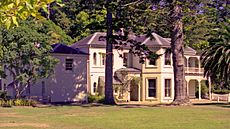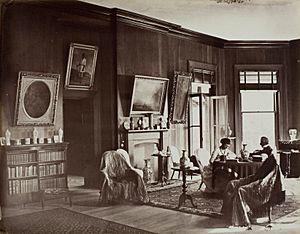Mansion House, Kawau Island facts for kids
Quick facts for kids Mansion House |
|
|---|---|

Mansion House on Kawau Island in 2006
|
|
| General information | |
| Address |
|
| Coordinates | 36°25′49.70″S 174°49′7.27″E / 36.4304722°S 174.8186861°E |
| Completed | 1845 |
| Renovated | 1862–67, 1977 |
| Design and construction | |
| Architect | Frederick Thatcher |
| Designated: | 23 June 1983 |
| Reference #: | 8 |
Mansion House is a famous building on Kawau Island in New Zealand. It was once owned by Sir George Grey, a very important person in New Zealand's history. He was the Governor of New Zealand twice!
The house was first built in 1845 for the manager of a copper mine. Sir George Grey bought it in 1862 and made it much bigger. Today, Mansion House is a special heritage building. You can visit it as part of the Kawau Island Historic Reserve. The Department of Conservation looks after it.
Kawau Island's Past
Kawau Island is in the Hauraki Gulf. It is about 60 kilometers from Auckland. Māori people lived on the island for a long time. In 1839, a company bought the island. They wanted to use its timber.
In 1844, people found copper on the island. A mine was quickly set up. But the mine had problems. Water flooded the shafts. Many workers left to find gold in Australia. The copper mine closed in 1855. About 3,000 tonnes of copper had been taken out.
The island was put up for sale in 1862. Sir George Grey bought it for £3,500. He had just started his second time as Governor of New Zealand.
Mansion House History
The first part of Mansion House was built in 1845. It was a two-story brick house with 11 rooms. Captain James Ninnis, the mine manager, lived there.
When Sir George Grey bought the island, he loved the house. He liked its strong walls and kauri timber. He also loved the beautiful views around it. He hired an architect named Frederick Thatcher. Thatcher added more bedrooms, a dining room, and a drawing room. He kept the house's original Georgian architecture style. He added a new part with a long verandah and a bay window. An Auckland builder finished the work for £5,000.
Sir George Grey lived in the house from 1870 to 1874. After that, he used it as a holiday home. His niece also lived there for much of this time. Grey spent a lot of money on the property. He filled the house with amazing items from all over the world. He also brought in rare plants and animals for his gardens. In 1888, because his health was getting worse, Grey sold the island.
The new owners added the special verandahs to the front of the house. An architect named Robert Watt designed them. By 1901, the house was known as Mansion House. Over the next years, much of the land around it was sold off. The house itself had several different owners. Kawau Island was a popular place for tourists from Auckland. For many years, Mansion House was run as a hotel.
In 1967, the last owner sold the house and land to the New Zealand Government. It became part of the Hauraki Gulf Maritime Park. Mansion House continued to be a hotel for a while. But some changes were made that didn't fit the building's history. In 1977, the hotel stopped operating. The house was then carefully restored. Workers made it look like it did in the 1890s.
Mansion House opened to the public in October 1979. It is now filled with old furniture and decorations. These items are either borrowed or donated.
Mansion House is a very important historic site. It was officially registered by the New Zealand Historic Places Trust in 1983. This trust is now called Heritage New Zealand. The building has a Category I listing. This means it is a place of great historical importance. The Department of Conservation manages it. It is part of the Kawau Island Historic Reserve.
Images for kids



